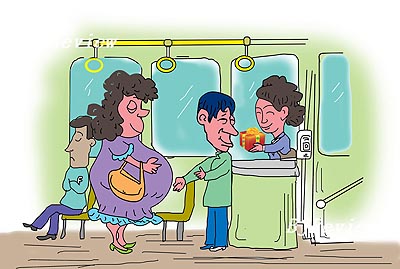|

If someone does you a good turn, do you reward them or not? Chinese society is currently caught in a debate about the morality of offering a helping hand as a gesture of human kindness, versus the wisdom offered by Confucius, who advocates help must be rewarded in some way.
This is illustrated by an ancient story about Zilu, one of Confucius's students, who saved a child from drowning. The child's father gave Zilu a cow as reward. Zilu took the cow without hesitation after which Confucius praised him for taking the reward. His reasoning was that if Zilu saved a person without taking anything as a reward, while he might be glorified by many, his actions would form an idea in people's minds that no reward was necessary after receiving help. In this way, few people would want to help others, and this would eventually be harmful to society
Although the ideas of Confucius do contradict those of many, some localities in China are implementing new regulations that are quite similar with the thoughts of the country's most revered sage.
Since 2005, bus companies in some cities, such as Shanghai, Changchun and Yantai, have begun to reward passengers who offer up their seats to others. The bus carrier in Beijing also included a "star passenger" in its three-year service upgrading commendation initiative, which offers material rewards to the passengers who, of their own accord, offer seats to children, the elderly, disabled persons and expectant mothers. These initiative unavoidably stirred up a hornet's nest.
The detractors regard it as an insult to traditional virtues of respecting seniors and taking care of juniors. They say the practice will either motivate ill-intended people to grab seats and then offer them for money's sake, or it will keep well-mannered passengers from offering up their seats for fear of being criticized.
The supporters, on the other hand, regard rewarded seat-offering as helpful toward building good social morals. They say since the moral standards of society cannot be lifted substantially over a short period, people will begin by offering seats for material rewards, and then gradually form a good habit. Any negative side effects of the material rewards are small compared with its positive long-term benefits, they say.
‘Thank you' is enough
Ma Longhua (hlj.rednet.cn): There are fewer and fewer people offering up their seats on buses voluntarily, so how to preserve our traditional moral virtues in modern society is a problem. The initiative to reward seat-offering is a new way to address this problem. However, if material rewards cannot work over a period of time, how can we find other ways to save the descending moral standards?
Therefore, this attempt is just a makeshift measure, as to fundamentally lift the moral standards cannot rely just on material incentives. The idea of "money can do anything" provides for rewarding seat-offering, but citizens should have the consciousness to offer seats without being stimulated by money.
Wen Guopeng (www.chinacourt.org): With increasing exposure of the declining moral standards of Chinese people in recent years, the reconstruction of a social moral system has become no easy task.
From commending volunteers to listing filial piety as an important criterion in assessment of government officials' performance, the government links morality with material interests. The initiative to reward seat-offering follows the same pattern.
However, all these measures, viewed in perspective, focus on the use of material incentives to lift moral standards. But when money is involved in seat-offering, the motivation becomes unclear, and gratitude from the people being helped will not be very sincere. In this way, the initiative does not revitalize public morality, but actually goes in the opposite direction.
This system will give the public the impression that all good deeds should be paid for. Once this idea takes hold in society, traditional virtues will be destroyed. It's no better than drinking poison to quench your thirst.
Gao Fusheng (www.ycwb.com): Seat-offering, as a widely appreciated form of behavior, is rewarded in the form of spiritual happiness. The intention of doing a favor for others is not for money.
| 